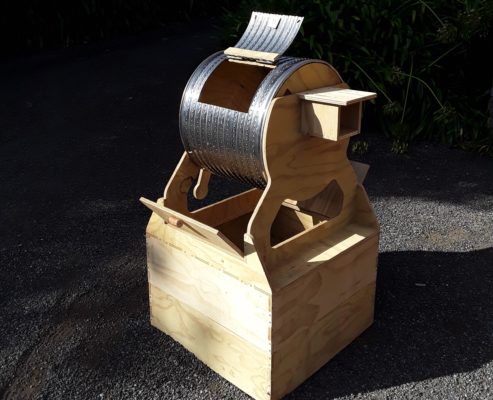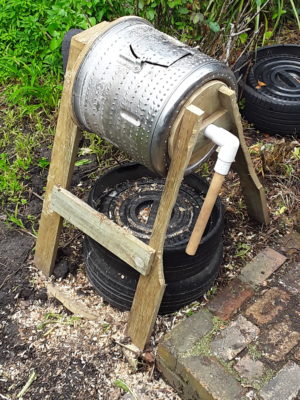What’s a broken-down washing machine got to do with backyard predator control? Not a trick question – just an example of the creative and inventive lengths some entrepreneurs will go to in order to nab rodent compost bin raiders.
Hannah Smith in Auckland, had a problem. She wanted to recycle food scraps and garden waste in an environmentally responsible way. But rats kept raiding the compost bin and, with all those tasty food scraps on offer, they were turning their twitchy noses up at the bait in her everyday rat traps.

There was no trouble attracting rats to the compost, but they wouldn’t go into her traps – so what if the compost bin WAS the trap? The germ of an idea was born and Hannah, an industrial design graduate, was up for the challenge. She would design a rat-trapping compost bin.
Over the next couple of years that’s exactly what she did.
“The rats needed to be able to access the compost easily, but get killed when they tried to exit,” Hannah explains. “I was working making props in the film industry and asked the engineers at work about it. They thought I was crazy.”
Undeterred, Hannah worked at developing a bin and even attempted to come up with her own trap mechanism.
“Trying to make a trap myself was hilarious and difficult,” she admits. “The old ‘snap trap’ is fantastic engineering. My attempts were just elaborate tickle devices.”
So Hannah abandoned her early trap-design attempts and focussed on the compost bin itself.
A normal compost bin with an entranceway doesn’t work. If you want to compost a dead rat without a bad smell your compost needs to be alive and vigorous and rotational compost bins help that happen.
An escape-proof, rotating, fast-acting compost bin… Hannah knew what she wanted, but not how to get it. Then came the all-important ‘lightbulb moment’!
“Using a washing machine drum was a great development! It’s weatherproof, it has perforations for the compost to breathe, it’s rotational and its rat-proof, so the rats can only get in through the entrance.”
The composting unit is positioned over a raised garden bed, so that when the bin is full it can be emptied into the bed and then when the raised bed is full the unit can be moved to the next raised bed. It’s designed to be easy for rats to get into, but they need to take an alternative and deadly route out. Hannah has branded her invention as ‘Urbins’ – bins for urban backyards.

“At the moment I use Gorilla rat traps, but they’re plastic and I’d prefer not to use plastic. They’re also quite hard to set. But I like that they’ve got a really chunky spring so it’s a clean kill. I also like the idea that rats and mice are having a nice time before they’re snapped.”
The condemned rodents get to have a hearty meal – a smorgasbord of rodent delights where they can eat all they like, but they never leave!
“It sometimes takes the rats a while to become familiar with the set-up, but I set one up for a lady recently and she caught a rat the next day. Last week we caught 2 mice in 1 trap. They must’ve both jumped in at the same time.”
Hannah entered her Ubin idea in the WWF New Zealand innovation competition, where the proposal got a lot of support.
Entering was a real boost to getting the design sorted. The WWF entry was a pretty hokey, bodged together atrocity!” Hannah admits. “But now it’s a really cute unit. It looks like a real product. A friend, Rob Askew, is a 3D modeller and he came up with a plywood design and there’s been a lot of interest.
Hannah is now catching up on orders.
“There are about 20 urbins out there, including a couple that were sent to Wellington. The units are handmade and the fittings are stainless steel making an Urbin pricier than your average plastic compost bin especially when you add shipping.
Hannah does, however, sell plans for the units for those outside of Auckland who are practically minded and have a spare washing machine drum.
“Eight very brave people have bought the plans so far and I know at least one of those people has built an Urbin” Hannah says. “Drums are the limiting resource and I’m waiting for some at the moment. They’re a high energy item to manufacture so it’s great getting to re-use them.”
She may soon have some help with sourcing the drums.
“I have been in touch with Abilities Group which is a non-profit, incorporated society that provides work for people with disabilities. They already dismantle washing machine so its perfect.”
Like the gardens that Hannah’s rat-infused compost is nurturing, the Urbin composter idea is one which grows and grows.
“It ticks all the boxes. It’s good for predator control, good for composting, good for the garden and good psychologically.”
Even disposal of the dead rodents is sorted and, for the more tender-hearted trappers, there’s satisfaction in knowing they died quickly and well fed.

